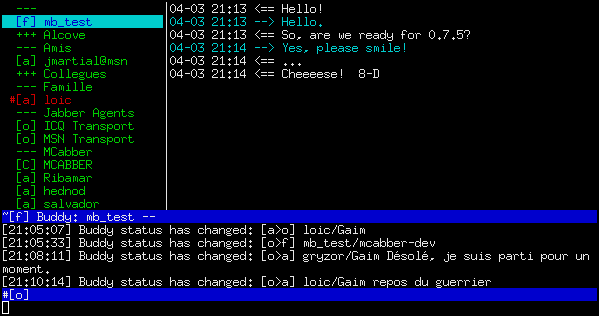mcabber is a small XMPP (Jabber) console client.
The mcabber screen is divided into 4 regions. The roster, alias buddylist, is on the left. The chat window, or chat buffer, is on the right. The input line lies at the bottom of the screen, under a small log window.
Two status lines surround the log window. The bottom status line is the “main status line” and reflects mcabber general status. The other line is the “chat status line” and shows the status of the currently selected buddy.
To display buddies chat buffers, you will have to enter chat mode. You can enter chat mode by pressing enter (unless vi mode is enabled), and leave chat mode with the ESC key. Simply sending a message will also enable chat mode (unless vi mode is enabled).
There are several advantages to the two-mode implementation: first, it allows accurate “unread” message functionality, as described in the next section; without this, merely scrolling to a specific buddy will “read” the new messages of all buddies in-between. Second, it allows quickly hiding the conversation with a single keystroke. Third, it allows jumping between the few buddies with whom you are conversing with the /roster alternate command described in another section, without having to manually scroll back and forth.
Features include:
- SASL/SSL/TLS support.
- MUC (Multi-User Chat) support.
- History logging – save discussions to text history log files.
- Command completion – complete your command line if you hit the Tab key.
- OpenPGP encryption.
- OTR (Off-the-Record Messaging) support.
- Chat States support (typing notifications).
- Input line history – any message or command entered is in the input line history and can be reused easily.
- Dynamic modules that extend the program’s functionality.
- External action triggers – some events (like receiving a message) can trigger an external action such as a shell script if you enable it in your configuration file.
- Cross-platform support – runs under Linux, BSD, Mac OS X, and Windows (via Cygwin).
Website: mcabber.com
Support: User Guide
Developer: Mikael Berthe and others
License: GNU General Public License

mcabber is written in C. Learn C with our recommended free books and free tutorials.
Return to Console-Based XMPP Clients
| Popular series | |
|---|---|
| The largest compilation of the best free and open source software in the universe. Each article is supplied with a legendary ratings chart helping you to make informed decisions. | |
| Hundreds of in-depth reviews offering our unbiased and expert opinion on software. We offer helpful and impartial information. | |
| The Big List of Active Linux Distros is a large compilation of actively developed Linux distributions. | |
| Replace proprietary software with open source alternatives: Google, Microsoft, Apple, Adobe, IBM, Autodesk, Oracle, Atlassian, Corel, Cisco, Intuit, SAS, Progress, Salesforce, and Citrix | |
| Awesome Free Linux Games Tools showcases a series of tools that making gaming on Linux a more pleasurable experience. This is a new series. | |
| Machine Learning explores practical applications of machine learning and deep learning from a Linux perspective. We've written reviews of more than 40 self-hosted apps. All are free and open source. | |
| New to Linux? Read our Linux for Starters series. We start right at the basics and teach you everything you need to know to get started with Linux. | |
| Alternatives to popular CLI tools showcases essential tools that are modern replacements for core Linux utilities. | |
| Essential Linux system tools focuses on small, indispensable utilities, useful for system administrators as well as regular users. | |
| Linux utilities to maximise your productivity. Small, indispensable tools, useful for anyone running a Linux machine. | |
| Surveys popular streaming services from a Linux perspective: Amazon Music Unlimited, Myuzi, Spotify, Deezer, Tidal. | |
| Saving Money with Linux looks at how you can reduce your energy bills running Linux. | |
| Home computers became commonplace in the 1980s. Emulate home computers including the Commodore 64, Amiga, Atari ST, ZX81, Amstrad CPC, and ZX Spectrum. | |
| Now and Then examines how promising open source software fared over the years. It can be a bumpy ride. | |
| Linux at Home looks at a range of home activities where Linux can play its part, making the most of our time at home, keeping active and engaged. | |
| Linux Candy reveals the lighter side of Linux. Have some fun and escape from the daily drudgery. | |
| Getting Started with Docker helps you master Docker, a set of platform as a service products that delivers software in packages called containers. | |
| Best Free Android Apps. We showcase free Android apps that are definitely worth downloading. There's a strict eligibility criteria for inclusion in this series. | |
| These best free books accelerate your learning of every programming language. Learn a new language today! | |
| These free tutorials offer the perfect tonic to our free programming books series. | |
| Linux Around The World showcases usergroups that are relevant to Linux enthusiasts. Great ways to meet up with fellow enthusiasts. | |
| Stars and Stripes is an occasional series looking at the impact of Linux in the USA. | |
